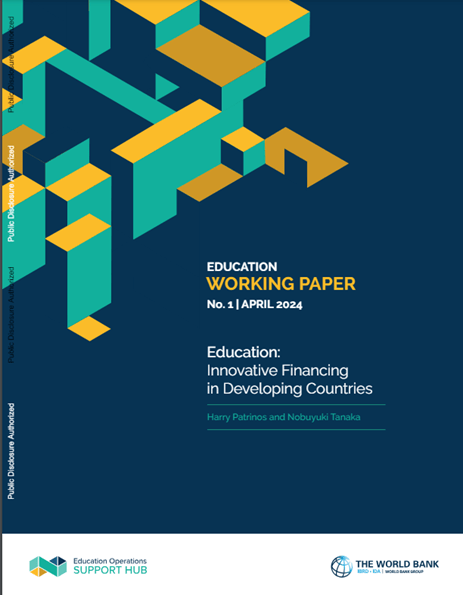Innovative Financing | (News and Research 381)
Education: Innovative Financing in Developing Countries | Patrinos & Tanaka | Despite efforts to generate more funds for education, current

financing in the education sector is inadequate, inefficient, and inequitable to ensure quality education and improve learning outcomes. One way to fill the financing gap is “innovative finance,” which means not only sourcing new and additional funds but also spending these funds efficiently and effectively. Blended finance, one type of innovative finance, uses public funds to attract private capital to sustainable development projects by minimizing their risk. The use of blended finance has spread over the past decade in the energy sector for example, but there is scope for it to be applied more widely in the education sector.

To attract more investment into blended financing deals in education, consider: (1) Enhancing the understanding of blended finance and its impact among key stakeholders – such as governments, private investors, and DFI/MDBs. As a first step, they need to familiarize themselves with the concept of blended finance and understand key aspects such as additionality, impact, return, risks, and mitigation measures. Subsequently, they need to delve into the process of designing, preparing, and implementing blended finance initiatives, while also learning from existing applications of the approach to learn from any implementation challenges. In other words, the education sector needs to present more bankable projects – that is, designing them in a way that investors can see the route to progress towards the intended outcomes. This will require that more emphasis be put on measurement and using the evidence base to finance the most effective initiatives. There will be a need to make the case that the education sector is viable and sustainable and that investing in education makes other investments more productive as skilled workers are needed to manage those investments;
(2) Assessing and strengthening the readiness of governments, DFIs, and MDBs to attract private investment. The private sector is hesitant to invest in developing countries because of poor market conditions. Therefore, to attract substantial private sector investment, governments of low-income countries need to be prepared to embrace blended finance, particularly in the education sector, by generating investable opportunities. This involves creating favorable investment conditions, implementing capacity building initiatives, and adopting a whole-of-government approach. Concrete steps in this direction would include evaluating market conditions, forming task forces among relevant ministries, and identifying specific subsectors for investment and viable blended financing mechanism in the local context. DFI/MDBs could assess their institutional mechanisms to allocate a portion of their funds for catalytic purposes while continuing to provide direct financial support to the education sector. DFI/MDBs could also actively collaborate with governments and private investors to increase countries’ readiness to implement blended finance in education. They could provide grants and technical assistance to countries to help them to prepare to implement blended finance, including, for instance, to design investable projects; and
(3) Integrating blended finance into education funding. All stakeholders need to proactively plan for its future implementation and scale-up and ensure that it attracts considerable private investment in initiatives with a strong development impact. One approach would be to incorporate blended finance mechanisms into countries’ national and sectoral development strategies and plans, the private sector’s investment strategies, and donors’ investment policies and plans. It will also be essential to assess the investment viability of the entire education system.
* * * * * * * * * *
New Developments in the Economics of Education | Exciting opportunity to present your research on the economics of education at the Public Sector Economics 2024 Conference September 23, 2024, in Zagreb, Croatia. Submit proposals by May 15 here. Keynote speakers: Daniele Checchi, University of Milan, Italy and Harry Anthony Patrinos, World Bank.
